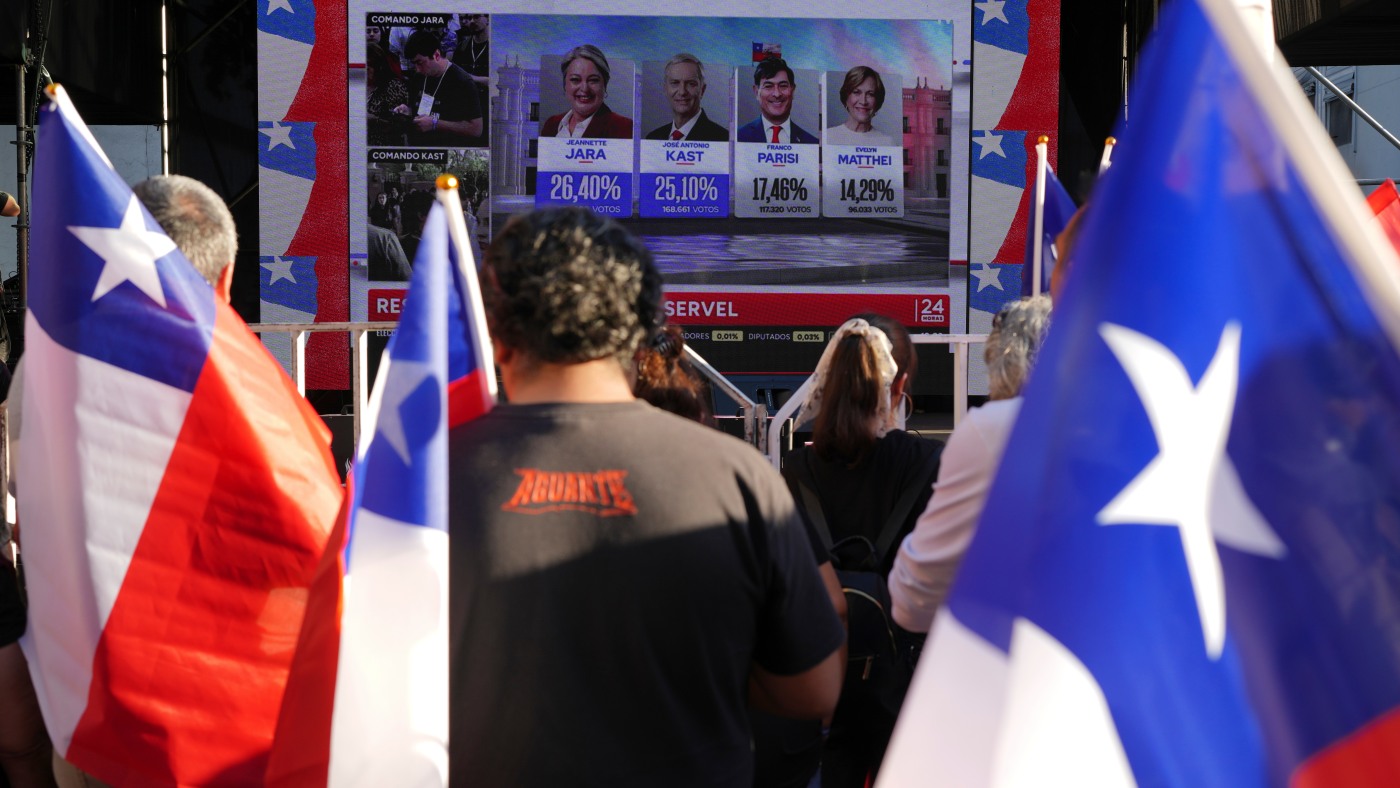Chile’s presidential race heads to a polarizing runoff : NPR

Supporters of presidential candidate Jeannette Jara of the Unidad por Chile coalition watch results come in during general elections in Santiago, Chile, Sunday, Nov. 16, 2025.
Natacha Pisarenko/AP
hide caption
toggle caption
Natacha Pisarenko/AP
SANTIAGO, Chile — Two candidates with drastically different ideologies, priorities and diagnoses for the future will come head to head in a presidential runoff vote next month in Chile.
The campaigns have been dominated by the issues of public security, illegal immigration and organized crime.
Communist Party politician Jeannette Jara, 51, who served as labor minister under current leftwing president Gabriel Boric, won the highest share of the vote on the day with 27%.
She sent “a brotherly embrace to all those who voted for me, and also to those who didn’t,” calling for unity and began to appeal to the other candidates for their voters’ support.
Jara is promising to gradually introduce a minimum income of $780 per month, as well as cash transfers to workers, and subsidies for small businesses.
“We will have some difficult days ahead, but that’s how I like it,” she said.

Presidential candidate Jeannette Jara of the Unidad por Chile coalition addresses supporters after early results in the general elections in Santiago, Chile, Sunday, Nov. 16, 2025.
Natacha Pisarenko/AP
hide caption
toggle caption
Natacha Pisarenko/AP
But a moral victory has been claimed by far-right contender José Antonio Kast, 59, who is running for the presidency for a third time and will face off with Jara in a second round on Dec. 14.
He pledged to “change Chile from the roots,” should he win December’s runoff, which he described as a “plebiscite on two models for society.”
Kast has run a campaign with clear influences gleaned from Donald Trump’s electoral triumphs. He has avoided talking about his hardline social values at all cost, instead focusing on his proposals to criminalize irregular migration, dig border ditches and build walls, and construct new high-security jails.
In an upscale Santiago district where a stage had been erected on the road outside his Republican Party headquarters, a small group of mostly young people, many wrapped in Chile flags and sporting Kast baseball caps, cheered loudly and broke into Chile’s national anthem when early results showed that Kast was projected to make the runoff.
“We have the chance to get Chile back,” said Felipe Atenzo, a 60-year-old public employee. “It’s an emergency today in Chile in terms of terrorism, illegal immigration, crime, health and education. Kast embodies the values which can get us out of this mess.”
Kast was eventually introduced to a baying crowd alongside his wife. He was careful never to step beyond the outline of a pane of bulletproof glass which had been placed in front of his podium. Kast has been the only candidate to take such measures on the campaign trail. His nine children sat at the foot of the stage shrieking their approval whenever his speech crescendoed.

Presidential candidate Jose Antonio Kast of the Republican Party, addresses supporters after early results in the general elections in Santiago, Chile, Sunday, Nov. 16, 2025.
Esteban Felix/AP
hide caption
toggle caption
Esteban Felix/AP
Kast, who thanked the other rightwing candidates and appealed for their support, is the overwhelming favorite to win the presidency.
“I think that there is an anti-party, anti-politics and anti-elite element which in this case has been expressed as a vote against a leftist government,” Claudia Heiss, a political scientist at the Universidad de Chile’s school of government.
Kast described President Boric’s government as “the worst in Chile’s democratic history.”
Johannes Kaiser, a libertarian YouTuber-turned-congressman is further to the right than even Kast, took 14% of the vote, while Franco Parisi managed to convince nearly 20% of the electorate to vote for him – confounding expectations as he did four years ago.
Evelyn Matthei, long a figure on the traditional right of Chilean politics, who has tried to present herself as more moderate after two terms as mayor of a wealthy Santiago district, claimed 12% of ballots cast.
In total, the rightwing candidates claimed over 70% of the vote, meaning that Jara has an uphill struggle ahead of her if she is to convince the electorate that her leftwing agenda and ties to the Boric government are worth persisting with.
The runoff will be held on Dec. 14 and the winner will take office on March 11, 2026.
Source link

